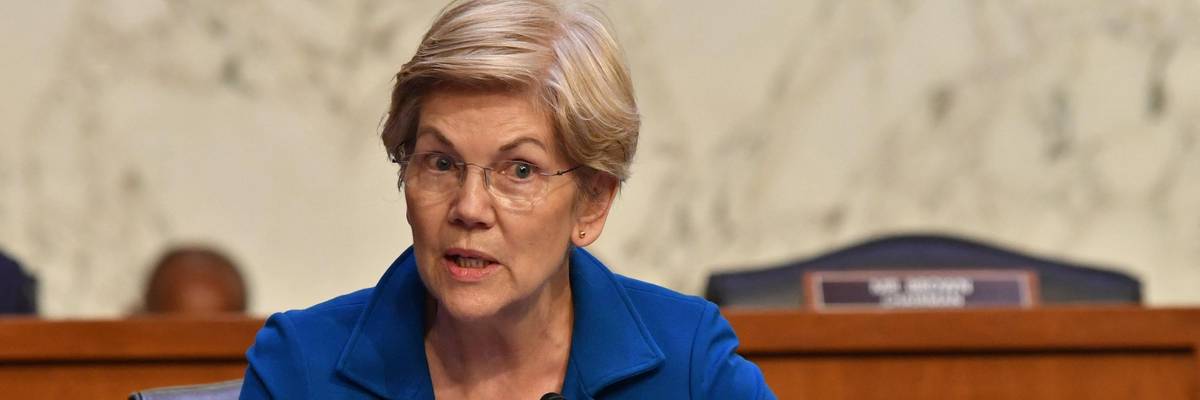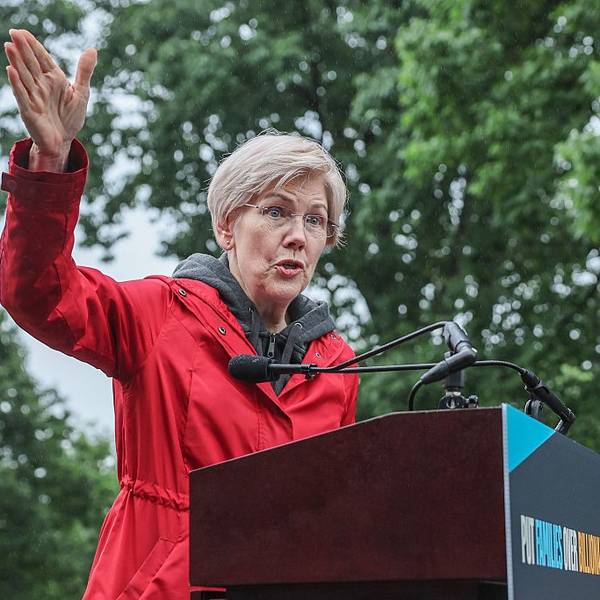
Sen. Elizabeth Warren (D-Mass.) questions Federal Reserve Chair Jerome Powell during a hearing on June 22, 2022 in Washington, D.C. (Photo: Nicholas Kamm/AFP via Getty Images)
Warren Warns Powell That Fed's Rate Hikes Could Drive US Economy 'Off a Cliff'
"You know what's worse than high inflation and low unemployment? It's high inflation with a recession and millions of people out of work," Sen. Elizabeth Warren told Jerome Powell.
Sen. Elizabeth Warren on Wednesday told Federal Reserve Chair Jerome Powell directly that the central bank's recent decision to enact more aggressive interest rate hikes in an effort to combat inflation could push the U.S. economy "off a cliff"--and throw millions of people out of work--without reining in soaring prices.
"Inflation is like an illness and the medicine needs to be tailored to the specific problem, otherwise you could make things a lot worse," Warren (D-Mass.) said during her remarks at a Senate Banking Committee hearing. "Right now, the Fed has no control over the main drivers of rising prices."
Powell conceded the latter point under questioning from the Massachusetts Democrat, who asked whether the Fed's interest rate hikes are expected to have any impact on gas and food prices--two of the principal drivers of inflation.
"I would not think so, no," Powell said in response to Warren's question on whether rate hikes will cut gas prices.
Regarding food prices, the Fed chair provided a virtually identical answer: "I wouldn't say so, no."
Watch the exchange:
Last week, the central bank's Federal Open Market Committee voted unanimously to hike the benchmark federal-funds rate by 75 basis points, the largest increase in nearly three decades.
The Fed's latest rate hike came on the heels of a worse-than-expected inflation report showing that price increases accelerated in May as Russia's war in Ukraine raged on and supply chain issues stemming from the coronavirus pandemic persisted.
The central bank's pivot to larger rate hikes--which are aimed primarily at weakening demand--sparked warnings from economists that the Fed is on the verge of dramatically slashing investment, leading ultimately to slower growth, higher unemployment, and lower wages.
Warren echoed those warnings during Wednesday's hearing, saying that while the Fed can't cut gas or grocery prices with the blunt tools at its disposal, it can "slow demand by getting a lot of people fired and making families poorer."
"Rate hikes won't make Vladimir Putin turn his tanks around and leave Ukraine," Warren said. "Rate hikes won't break up monopolies. Rate hikes won't straighten out the supply chain, or speed up ships, or stop a virus that is still causing lockdowns in some parts of the world."
"You know what's worse than high inflation and low unemployment?" she continued. "It's high inflation with a recession and millions of people out of work. I hope you consider that before you drive this economy off a cliff."
Powell, for his part, acknowledged during his Senate testimony that the Fed's approach to tackling inflation could push the U.S. economy into recession.
"It's not our intended outcome at all," Powell said, "but it's certainly a possibility."
An Urgent Message From Our Co-Founder
Dear Common Dreams reader, The U.S. is on a fast track to authoritarianism like nothing I've ever seen. Meanwhile, corporate news outlets are utterly capitulating to Trump, twisting their coverage to avoid drawing his ire while lining up to stuff cash in his pockets. That's why I believe that Common Dreams is doing the best and most consequential reporting that we've ever done. Our small but mighty team is a progressive reporting powerhouse, covering the news every day that the corporate media never will. Our mission has always been simple: To inform. To inspire. And to ignite change for the common good. Now here's the key piece that I want all our readers to understand: None of this would be possible without your financial support. That's not just some fundraising cliche. It's the absolute and literal truth. We don't accept corporate advertising and never will. We don't have a paywall because we don't think people should be blocked from critical news based on their ability to pay. Everything we do is funded by the donations of readers like you. Will you donate now to help power the nonprofit, independent reporting of Common Dreams? Thank you for being a vital member of our community. Together, we can keep independent journalism alive when it’s needed most. - Craig Brown, Co-founder |
Sen. Elizabeth Warren on Wednesday told Federal Reserve Chair Jerome Powell directly that the central bank's recent decision to enact more aggressive interest rate hikes in an effort to combat inflation could push the U.S. economy "off a cliff"--and throw millions of people out of work--without reining in soaring prices.
"Inflation is like an illness and the medicine needs to be tailored to the specific problem, otherwise you could make things a lot worse," Warren (D-Mass.) said during her remarks at a Senate Banking Committee hearing. "Right now, the Fed has no control over the main drivers of rising prices."
Powell conceded the latter point under questioning from the Massachusetts Democrat, who asked whether the Fed's interest rate hikes are expected to have any impact on gas and food prices--two of the principal drivers of inflation.
"I would not think so, no," Powell said in response to Warren's question on whether rate hikes will cut gas prices.
Regarding food prices, the Fed chair provided a virtually identical answer: "I wouldn't say so, no."
Watch the exchange:
Last week, the central bank's Federal Open Market Committee voted unanimously to hike the benchmark federal-funds rate by 75 basis points, the largest increase in nearly three decades.
The Fed's latest rate hike came on the heels of a worse-than-expected inflation report showing that price increases accelerated in May as Russia's war in Ukraine raged on and supply chain issues stemming from the coronavirus pandemic persisted.
The central bank's pivot to larger rate hikes--which are aimed primarily at weakening demand--sparked warnings from economists that the Fed is on the verge of dramatically slashing investment, leading ultimately to slower growth, higher unemployment, and lower wages.
Warren echoed those warnings during Wednesday's hearing, saying that while the Fed can't cut gas or grocery prices with the blunt tools at its disposal, it can "slow demand by getting a lot of people fired and making families poorer."
"Rate hikes won't make Vladimir Putin turn his tanks around and leave Ukraine," Warren said. "Rate hikes won't break up monopolies. Rate hikes won't straighten out the supply chain, or speed up ships, or stop a virus that is still causing lockdowns in some parts of the world."
"You know what's worse than high inflation and low unemployment?" she continued. "It's high inflation with a recession and millions of people out of work. I hope you consider that before you drive this economy off a cliff."
Powell, for his part, acknowledged during his Senate testimony that the Fed's approach to tackling inflation could push the U.S. economy into recession.
"It's not our intended outcome at all," Powell said, "but it's certainly a possibility."
Sen. Elizabeth Warren on Wednesday told Federal Reserve Chair Jerome Powell directly that the central bank's recent decision to enact more aggressive interest rate hikes in an effort to combat inflation could push the U.S. economy "off a cliff"--and throw millions of people out of work--without reining in soaring prices.
"Inflation is like an illness and the medicine needs to be tailored to the specific problem, otherwise you could make things a lot worse," Warren (D-Mass.) said during her remarks at a Senate Banking Committee hearing. "Right now, the Fed has no control over the main drivers of rising prices."
Powell conceded the latter point under questioning from the Massachusetts Democrat, who asked whether the Fed's interest rate hikes are expected to have any impact on gas and food prices--two of the principal drivers of inflation.
"I would not think so, no," Powell said in response to Warren's question on whether rate hikes will cut gas prices.
Regarding food prices, the Fed chair provided a virtually identical answer: "I wouldn't say so, no."
Watch the exchange:
Last week, the central bank's Federal Open Market Committee voted unanimously to hike the benchmark federal-funds rate by 75 basis points, the largest increase in nearly three decades.
The Fed's latest rate hike came on the heels of a worse-than-expected inflation report showing that price increases accelerated in May as Russia's war in Ukraine raged on and supply chain issues stemming from the coronavirus pandemic persisted.
The central bank's pivot to larger rate hikes--which are aimed primarily at weakening demand--sparked warnings from economists that the Fed is on the verge of dramatically slashing investment, leading ultimately to slower growth, higher unemployment, and lower wages.
Warren echoed those warnings during Wednesday's hearing, saying that while the Fed can't cut gas or grocery prices with the blunt tools at its disposal, it can "slow demand by getting a lot of people fired and making families poorer."
"Rate hikes won't make Vladimir Putin turn his tanks around and leave Ukraine," Warren said. "Rate hikes won't break up monopolies. Rate hikes won't straighten out the supply chain, or speed up ships, or stop a virus that is still causing lockdowns in some parts of the world."
"You know what's worse than high inflation and low unemployment?" she continued. "It's high inflation with a recession and millions of people out of work. I hope you consider that before you drive this economy off a cliff."
Powell, for his part, acknowledged during his Senate testimony that the Fed's approach to tackling inflation could push the U.S. economy into recession.
"It's not our intended outcome at all," Powell said, "but it's certainly a possibility."

